Mutantes were ragged but wild, taking musical risks that other Brazilian artists weren't up to... Today, their music holds up very well, and sounds remarkable for how up-to-date they were with the trends of non-Brazilian pop: early albums mixed in Byrdsy, Beatlesy pop along with Sly Stone funk, Janis Joplin blues and sludgy heavy rock/prog. Singer Rita Lee added a folk-rock air to many tunes, creating the overall impression of a Bahian Stone Poneys who had wigged out while dosing with the guys from Spinal Tap. An apt comparison would be to their Polydor labelmate, the eclectic and limitlessly wacky Arthur Brown, in both his Crazy World and Kingdom Come incarnations.
At times, Mutantes may have been just a little too hip and ironic for their own good. After a while, Arnaldo Baptista's relentlessly mocking faux-bossa/lounge lizard vocals get to be a drag; they weren't nearly as funny as he thought they were. Rita Lee's more classically "pop" sensibility often brought waywardly proggy songs back on track, and one imagines it was this stylistic tension which contributed to her bailing from the band in the early 1970s.
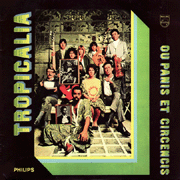 Various Artists "TROPICALIA: O PANIS ET CIRCENSIS" (Polygram, 1968)
Various Artists "TROPICALIA: O PANIS ET CIRCENSIS" (Polygram, 1968)

(Produced by Rogerio Duprat)
A collaborative statement of purpose for the hippie-ish tropicalia movement, with contributions from Gilberto Gil, Caetano Veloso, Nara Leao, Gal Costa and Os Mutantes. Mutantes are all over this disc, including their distinctive version of the Gil/Veloso track "Panis Et Circenses" ("Bread and Circuses"). The psychedelic panache of Mutantes is put to excellent use here, and they contribute oodles of playful, experimental artistic zeal. This disc is a highwater mark in the intersection of "world music" and international pop. Highly recommended, if you can find it.
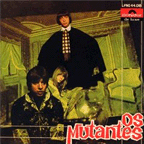 Os Mutantes "Os Mutantes" (Polydor, 1968)
Os Mutantes "Os Mutantes" (Polydor, 1968)


(Produced by Rogerio Duprat)
Their first album is their best, perhaps because they mostly cover other people's material. Contains some highly original takes on songs by Gilberto Gil, Caetano Veloso and Jorge Ben, the leading lights of the tropicalia movement. Fuzzed-out, post-Byrds electric guitars abound, as well as a host of rather subtle, Sgt. Pepper-ish psychedelic tweaks, and a distinctly Mamas and Papas folk-rock air when Rita Lee takes the fore. Their cover of Humberto Teixiera's "Adeus Maria Fulo" is a nugget of exotica which would make Arthur Lyman quite proud. All in all, this album is well worth the trendy attentiveness lavished recently upon it. Recommended.
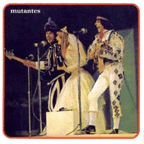 Os Mutantes "Mutantes" (Polydor, 1969)
Os Mutantes "Mutantes" (Polydor, 1969)


An extraordinary psychedelic rock album, with occasional joking nods at latin american traditional styles. The band busts out with heavy rock and trippy psych guitars, wacky vocals an innumerable shifts in tone and style. Highly recommended -- easily holds up to contemporary albums from England and North America.
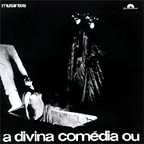 Os Mutantes "A Divina Comedia Ou Ando Desligado" (Polydor, 1970)
Os Mutantes "A Divina Comedia Ou Ando Desligado" (Polydor, 1970)


(Produced by Arnaldo Sacomani, arranged by Os Mutantes & Rogerio Duprat)
A tongue-in-cheek takeoff on Dantean heaven-and-hell themes, with early '70s rock and electric-lounge-blues trappings, especially the Gregg Rolie-cum-Procol Harum keyboards and thundering, sludgy electric bass. You could recommend this in kind of the same way you might be able to recommend Humble Pie to a friend on a '60s/'70s obscuro kick. Mutantes, however, stand beyond simple kitsch value; they were a very solid band, even when compared to the American and British rock bands of the same era. They completely rock out on the guitar-noise attack, "Oh! Mulher Infiel" which caps off the album. Plus, the goofy but dead-on Californian accents on "Quem Tem Medo De Brincar De Amor" are kind of a hoot.
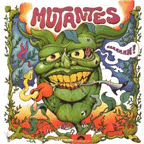 Os Mutantes "Jardim Eletrico" (Polygram, 1971)
Os Mutantes "Jardim Eletrico" (Polygram, 1971)

(Produced by Arnaldo Baptista, arranged by Os Mutantes & Rogerio Duprat)
Opening with the Sly and the Family Stone-ish "Tip Top," this album quickly goes off into proggish territory, including a wide swath of clunky hard-rock riffs, as well as a few Beatles-styled melodic flourishes. As on other records, Arnaldo Baptista's mocking jibes at latin pop schmaltz are kind of pointless, but they don't drag down the whole record. Rita Lee's folky English-language vocals on Caetano Veloso's "Baby" are a nice change of pace. (Baptista got to sing lead on a Portuguese version of this same song on their first album.)
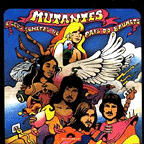 Os Mutantes "Mutantes E Seus Cometas No Pais Do Baurets" (Polygram, 1972)
Os Mutantes "Mutantes E Seus Cometas No Pais Do Baurets" (Polygram, 1972)

Heavy on early-'70s boogie rock and a bit less listenable than their previous albums. The acoustic, Wings-like Rita Lee track, "Vida de Cachorro" is a cute novelty song (she yips like a puppy at the end), and is probably the album's highpoint. Non-prog rockers could probably skip this one.
 Os Mutantes "O A E O Z" (Philips, 1973)
Os Mutantes "O A E O Z" (Philips, 1973)


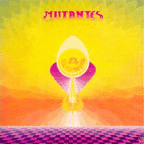 Os Mutantes "Tudo Foi Feito Pelo Sol" (Som Livre, 1974)
Os Mutantes "Tudo Foi Feito Pelo Sol" (Som Livre, 1974)

After the exit of Arnaldo Baptista, Mutantes prog tendencies shifted into mellower territory. This record might be a special treat for fans of Yes, Emerson, Lake & Palmer, or folks who thought the synth solo on "Fly Like An Eagle" was just too damn short. One track, "O Contrario de Nada e Nada," picks up the pace a little, in a melodic Beatles/boogie rock vein. Sergio Dias is the main songwriter, with contributions from Gilberto Gil's future producer, Liminha. Not as awful as you might imagine, but still a little embarrassing.
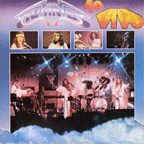 Os Mutantes "Ao Vivo" (Som Livre, 1976)
Os Mutantes "Ao Vivo" (Som Livre, 1976)


Sergio Dias soldiers on with this prog-pop stadium rock offering... Hearing this edition of the band play live in Rio is actually a lot more reassuring than their studio albums; you can kind of see why they thought it was still worth making the effort. Not as brilliant or as eccentric as the original Mutantes lineup, but more solid and professional than a lot of their South American contemporaries. It's funny to hear those little ELO-style synthesizer lines, though. Tee-hee.
 Os Mutantes "Tecnicolor" (Philips, 1970/1999)
Os Mutantes "Tecnicolor" (Philips, 1970/1999)


(Produced by Carlos Olmes)
A pretty cool "lost album" made up of English-language (and French!) recordings made in Paris, late in 1970. Rita Lee is still in the band, Liminha has also joined up, and everybody sounds in pretty good spirits. Mutantes were that odd breed of "foreign" rockers who actually sounded great singing outside their native tounge, Rita Lee in particular. You might expect this to be lame, but it's not. Not by a longshot! A few rough spots, but frankly this is better than most of their proper Portugese-language releases.
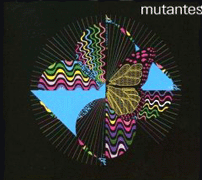 Os Mutantes "Live At The Barbican Theatre: 2006" (Luaka Bop, 2007)
Os Mutantes "Live At The Barbican Theatre: 2006" (Luaka Bop, 2007)


The long-rumored Os Mutantes reunion was one of the most highly anticipated events in the global hipster-sphere... This 2-CD live album captures the reconstituted group at London's Barbican Theatre, with '90s pop-rockster Zelia Duncan taking the place of Rita Lee, who declined to take part in the reunion. Probably just as well: even though it undercuts the historical impact of the band's comeback, Lee's absence means the music is stronger, since her musical output has been rather bland for several decades, and bereft of inspiration. Duncan, on the other hand, is younger, enthusiastic and full of good cheer and exudes a healthy dose of the chaotic charm that made Mutantes such a groovy band to begin with. She almost has trouble keeping up with the geezers, though: singer-pianist Arnaldo Baptista and his brother, guitarist Sergio Dias, burst with energy and excitement. It's been a long time since they could really cut loose and go crazy, and they clearly relish the chance to summon up their old magic again. Many of the sound elements appear to be prerecorded, but even with this technological crutch, the show is remarkably powerful and coherent. Recreating the kaleidoscopic avant orchestrations of their old hits, the duo rides atop the well-manicured cacophony, proving themselves as lively and inventive as ever. As with their original studio work, this may be a bit too cluttered and bombastic to listen to recreationally, but it's still great to hear these avant-pop heroes back in action.
Os Mutantes "Boxset Mutantes Ao Vivo" (Sony-BMG, 2007)


A 3-CD set...
 Os Mutantes "Haih Or Amortecedor" (Anti, 2009)
Os Mutantes "Haih Or Amortecedor" (Anti, 2009)


Best-Ofs
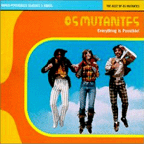 Os Mutantes "World Psychedelic Classics Vol. 1: Os Mutantes -- Everything is Possible!" (Luaka Bop, 1999)
Os Mutantes "World Psychedelic Classics Vol. 1: Os Mutantes -- Everything is Possible!" (Luaka Bop, 1999)


Once again, David Byrne and crew prove that there's an art to producing reissues, and that they are the masters of the craft. Like Byrne's celebrated BRAZIL CLASSICS series, this best-of is selective and revisionist; many of the Mutante's roughest edges have been knocked off or smoothed out, creating a wonderfully listenable disc which is very unlike the chaotic, all-over-the-map feel of the original Mutantes albums. Luaka's pop lapidarians have tumbled and massaged the nuggets and gravel of these tropicalia oldies long enough that now look like smoky beach glass. Even though I miss some of the funkier, crazier, blues-based material, I marvel at how coherent this collection is... definitely recommended!
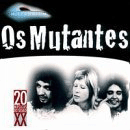 Os Mutantes "Millennium" (Polygram, 1999)
Os Mutantes "Millennium" (Polygram, 1999)

Os Mutantes "Novo Millennium" (Polygram, 2007)

Os Mutantes "It's Very Nice Pra Xuxu" (Box set) (Polygram, 2000)

A 7-CD box set, complete with a booklet and... well... seven whole CDs of Mutantes nuttitude! Wish I'd bought it when I had the chance...
Os Mutantes "De Volta Ao Planeta Dos Mutantes" (Universal-Brazil, 2006)

A 2-CD best-of covering their prime years,including their work backing other artists such as Rogerio Duprat and Gilberto Gil... Nice overview!
 Os Mutantes "A Arte De Os Mutantes" (Universal-Brasil, 2006)
Os Mutantes "A Arte De Os Mutantes" (Universal-Brasil, 2006)

An outstanding introduction to one of the key bands in Brazil's psychedelic rock revolution. While I must confess that I've kind of been "over" Os Mutantes for some time now, I still had to pick this disc up because of its unique concept: this 20-song collection doesn't just draw from the various Mutantes albums, but also from some of their best-known collaborations from other '60s rock pioneers, including the co-founders of the tropicalia scene. There's the fabled live 1968 performance of Caetano Veloso's "E Prohibido Prohibir," in which Brazilian bossa purists tried to boo the electric rockers off the festival stage, along with two other Veloso recordings from the same year. Gilberto Gil's irresistibly giddy psychedelic pop tunes, "Domingo No Parque" and "Procissao," also from '68, and a track off arranger Rogerio Duprat's solo album from the same year, as well as one track recorded with jovem guarda pop singer Ronnie Von. Mutantes's own catalog is also liberally represented, with wild songs from their earliest albums, alongside a respectful sampling of their later prog/hard rock records. This set cleverly and generously sorts through the band's tangled past, and presents a fresh look at their contributions to the seismic shifts in Brazilian culture... Great introduction to their work, and also a dandy item for folks who already have been on the bandwagon for a while. Snap it up!
Solo Albums
Mutantes On Other Artists Albums:
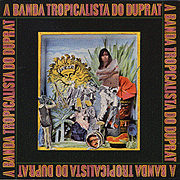 Rogerio Duprat "A Banda Tropicalista Do Rogerio Duprat" (1968)
Rogerio Duprat "A Banda Tropicalista Do Rogerio Duprat" (1968)

Hailed as a missing link and/or lost gem of the 'Sixties tropicalia scene, this was the first album by producer/arranger Rogerio Duprat, who helped shape the classical-avant elements of the early albums by key artists such as Gilberto Gil, Caetano Veloso and Os Mutantes. Duprat apparently studied in Europe with famed modernists such as Karlheinz Stockhausen and Boulez, but the musical ironies he brought to bear on his own recordings seem fairly facile. There are goofy, gogo-delic renditions of old sambas and modern bossa novae, but even taken as highbrow camp, or as cultural in-jokes that would have made sense to Brazilian intellectuals at the time, they still seem pretty ephemeral. I mean, this album's okay -- if you're into kitschy European soundtracks and stuff like that, this might be a lot of fun -- but it's not great or mindblowing... It includes a couple of Beatles songs and covers of other non-Brazilian pop hits of the day, and has Os Mutantes starring on four of the songs ("Cancao Para Ingles Ver," "Cinderella, Rockafella," "Lady Madonna" and the English-language "Rain, The Park And Other Things," which is an album highlight). Mutantes probably perform on the rest of the album as well (but don't quote me on that). Mutantes fans will want to check it out, as will devotees of Brazilian psychedelia, although it's a little hit or miss as to whether or not you'll find yourself revisiting this disc all that often. NOTE: The sound transfer on the 2005 reissue on the Cherry Red label is terrible... The music might benefit from a cleaner mix, but not so much so that you should pay big bucks for an original pressing...
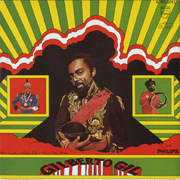 Gilberto Gil"Gilberto Gil" (Philips, 1968)
Gilberto Gil"Gilberto Gil" (Philips, 1968)

A pivotal album from the tropicalia years, with several great tunes and a few great flaws. The wacky rock band, Os Mutantes, back Gil up, adding a tasty '60s rock influence to tracks such as "Procissao" and "Coragem Pra Suportar." Beatles-y electric guitars converge with a zippy orchestra section and transmogrified samba rhythms, usually to wonderful effect. Much of this record has the goofy, rickety, absurdist character of the Mutantes own albums. As a result, some tracks meander, while others rock. Highly recommended, although the digital mastering on the1993 CD reissue seems somewhat sterile and flat, compared to the original LP.
Tributes
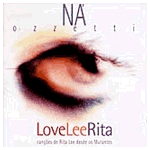 Na Ozzetti "Love Lee Rita: Cancoes De Rita Lee Desde Os Mutantes" (Dabliu, 1996)
Na Ozzetti "Love Lee Rita: Cancoes De Rita Lee Desde Os Mutantes" (Dabliu, 1996)

A tribute to Brazilian rocker Rita Lee... Ms. Ozzetti may be Rita Lee's number one fan -- this album of cover songs sure would be a strong indicator. But, like her idol, Ozzetti's music is plagued by goofy, mainstream pop production -- she's a little less over-the-top than Lee, but this stuff still doesn't float my boat.
Tater Totz "Alien Sleestacks From Brazil" (1988)
Check out the groovily hyperactive shout-out tribute to the Mutantes, a wacked-out version of "Bat Macumba..." Sure it's only one song on an album that's all over the map, but it's particularly notable for how early in the game this album was... This is, as far as I know, the first non-Brazilian cover of a Mutantes song -- as ever, the MacDonald brothers (aka Redd Kross) were way ahead of their retro brethren.
Various Artists "TIRE ESSA BERMUDA QUE EU QUERO VOCE MUTANTE!" (Natasha)
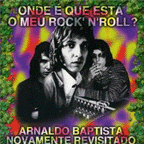 Various Artists "ONDE E QUE ESTA O MEU ROCK'N'ROLL? - ARNALDO BAPTISTA
NOVAMENTE REVISITADO" (Dabliu, 1999)
Various Artists "ONDE E QUE ESTA O MEU ROCK'N'ROLL? - ARNALDO BAPTISTA
NOVAMENTE REVISITADO" (Dabliu, 1999)

This low-rent Brazilian rocknroll tribute to ex-Mutante Arnaldo Baptista has its charms and its iffy moments as well... The repertoire includes material from Baptista's Mutantes days, as well as a bunch of his solo stuff. The bands are also pretty diverse, ranging from actively painful Pat Travers-style rockers (Nata Violeta, Ligacio Direta) to space rockers, grindcorers, Green Day clones, and goth-ish indie types of varying ability. It's not, to be honest, the greatest album ever. But you could look at it as the Brazilian equivalent of one of those zillions of mid-1980s postpunk rock comps that came out during the days when they still called it "college" rock. Also, keep in mind that Baptista wasn't the world's most coherent composer, so anyone covering his raggedy-ass material has a tough act to follow. Some of these songs hit the mark, others don't -- but for the hardcore Mutantes fan, this could definitely be worth checking out.
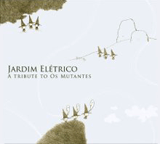 Various Artists "Jardim Eletrico - A Tribute To Os Mutantes" (Madcap, 2007)
Various Artists "Jardim Eletrico - A Tribute To Os Mutantes" (Madcap, 2007)


(Available directly from the label, Madcap Records, in Italy.)
Links
All Brazilian Music, as usual, has a good biographical sketch and discography page. They also have separate artist pages for Arnaldo, Rita and Sergio... A highly recommended website!
-
Darcio's Mutantes Home Page, has scans and track listings for all of their albums, as well as a list of their guest appearances and non-album tracks...
-
The New York Times ran an excellent article on Os Mutantes in April, 2001... bascially an interview with Rita Lee, it also provides some good information about the band and fills in a few blanks hitherto unknown...
-
D-Flexxx's "Algo Mais!" Geocities page has a nice layout, cool archival pix... and a glimpse or two of the rare, original collector-nerd vinyl LPs... Pretty cool!
-
Paf Paf e-Zine has an article (in French) about Os Mutantes and the 1968 TROPICALIA album... Another country heard from...!



Main Brazil Index

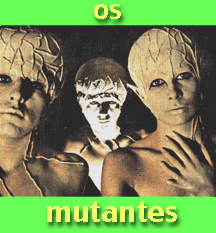 Os Mutantes -- founded by brothers Arnaldo Baptista and Sergio Dias Baptista along with singer Rita Lee --
was a pioneering psychedelic rock band at the center of Brazil's rock-tinged tropicalia movement of the late 1960s. One of the most chaotic and musically experimental groups of the late-'60s Brazilian crowd, Mutantes began performing together as teenagers, and played backup on the first solo albums of Caetano Veloso and Gilberto Gil, as well as on the landmark "TROPICALIA" compilation which also featured Veloso, Gil, Gal Costa and Nara Leao. Their aggressively experimental music was a radical departure from the earlier soft rock "roqueiro" scene which clustered around Roberto Carlos and his Jovem Guarda television show.
Os Mutantes -- founded by brothers Arnaldo Baptista and Sergio Dias Baptista along with singer Rita Lee --
was a pioneering psychedelic rock band at the center of Brazil's rock-tinged tropicalia movement of the late 1960s. One of the most chaotic and musically experimental groups of the late-'60s Brazilian crowd, Mutantes began performing together as teenagers, and played backup on the first solo albums of Caetano Veloso and Gilberto Gil, as well as on the landmark "TROPICALIA" compilation which also featured Veloso, Gil, Gal Costa and Nara Leao. Their aggressively experimental music was a radical departure from the earlier soft rock "roqueiro" scene which clustered around Roberto Carlos and his Jovem Guarda television show.























